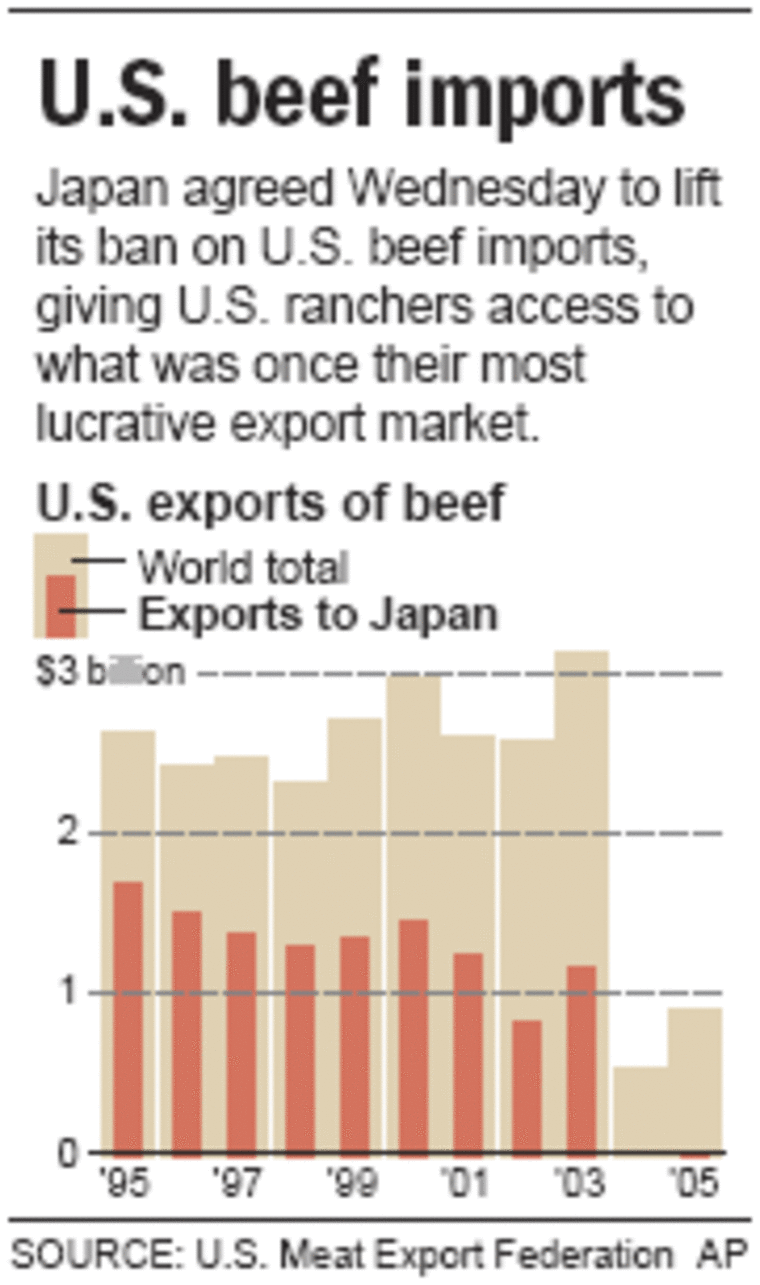Japan agreed Wednesday to lift a ban on U.S. beef imports, pending inspections of U.S. meat processing plants to dispel concerns over mad cow disease, the Agriculture Ministry said.
The breakthrough resolves a thorny, long-running trade dispute between the allies, and gives U.S. ranchers access to what was once their most lucrative export market.
“Japan agreed to resume U.S. beef imports on the condition that we find no further problems during onsite inspections,” said Agriculture Ministry official Hiroaki Ogura.
U.S. Ambassador Thomas Schieffer welcomed the conditional agreement, saying he was hopeful the outcome would lead to an import resumption.
American beef shipments to Japan were halted in January after Japanese officials found a veal shipment that contained backbone, which Asian countries consider at risk for mad cow disease. The cuts are eaten in the United States and other countries, but Japan’s rules are stricter.
Opposition party leaders and consumer groups criticized Wednesday’s decision as hasty. The Japan Consumers Union said it was reached for political reasons without regard for food safety or consumer health.
Social Democratic Party leader Mizuho Fukushima characterized the decision as “a souvenir” for Prime Minister Junichiro Koizumi to give President Bush when he visits the U.S. later this month, according to Kyodo News agency. The two leaders are scheduled to meet in Washington on June 29 and travel to Elvis Presley’s Graceland home in Memphis, Tenn., the next day.

Kyodo reported the inspections are meant to ensure that U.S. processing facilities conform with Japanese food safety guidelines. Officials from Japan’s health and agriculture ministries will inspect 35 meatpacking plants certified to ship beef to Japan to see if they are complying with export requirements, Kyodo said citing government officials.
Public broadcaster NHK said Japan may dispatch inspectors to the United States later this week.
Only facilities whose safeguards meet Japanese standards will be authorized to export to Japan, the report said. Japanese officials will also be allowed to accompany U.S. counterparts on spot inspections of U.S. facilities, it added. The accord requires the U.S. to conduct the inspections.
The deal was worked out via a video conference directed by Japanese Agriculture Ministry’s consumption safety director, Hiroshi Nakagawa, and his U.S. Agriculture Department counterpart, Chuck Lambert, deputy undersecretary for marketing and regulatory programs.
At stake was a trading relationship worth millions of dollars to the U.S. beef industry. Japan’s market was worth $1.4 billion annually when it banned American beef in response to the first U.S. case of mad cow disease in 2003.
The ban had only recently been lifted before Japan halted shipments earlier this year. The U.S. Agriculture Department said New York-based Atlantic Veal & Lamb and a government inspector misunderstood new trade rules when they allowed the prohibited veal to be shipped to Japan.
American officials had been impatient for trade to resume, with several U.S. senators saying Tuesday they were introducing a bill that would impose trade sanctions if Japan did not reopen its market to U.S. beef by Aug. 31.
Mad cow disease is medically known as bovine spongiform encephalopathy, or BSE. In humans, eating meat contaminated with BSE is linked to variant Creutzfeldt-Jakob Disease, a rare and deadly nerve disease.